
Visiting Aligarh Institutions in Islamabad, Lahore, and Karachi
By Zafar Iqbal, PhD

I am pleased to share my reflections on three remarkable institutions in Pakistan that serve as magnificent tributes to Sir Syed Ahmed Khan's enduring legacy: the Sir Syed Memorial in Islamabad, the New Aligarh University in Lahore, and the Sir Syed University of Engineering and Technology in Karachi. These institutions not only honor his invaluable contributions to education and social reform but also continue to inspire future generations to uphold his vision.
A Visionary Leader and Advocate of Modern Education
Sir Syed Ahmad Khan (1817–1898) was a visionary leader, educationist, and social reformer who played a pivotal role in uplifting the Muslim community in British India. Recognizing the socio-economic and educational backwardness of minorities, particularly Muslims, he championed modern education as the key to progress.

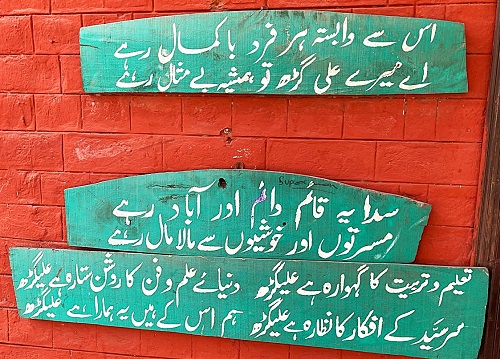
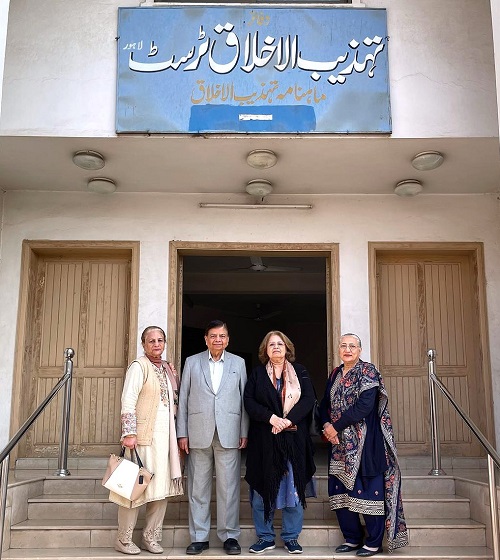
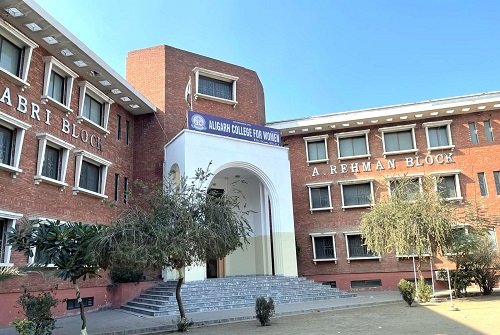
Tehzebul Akhlaq Trust complex buildings
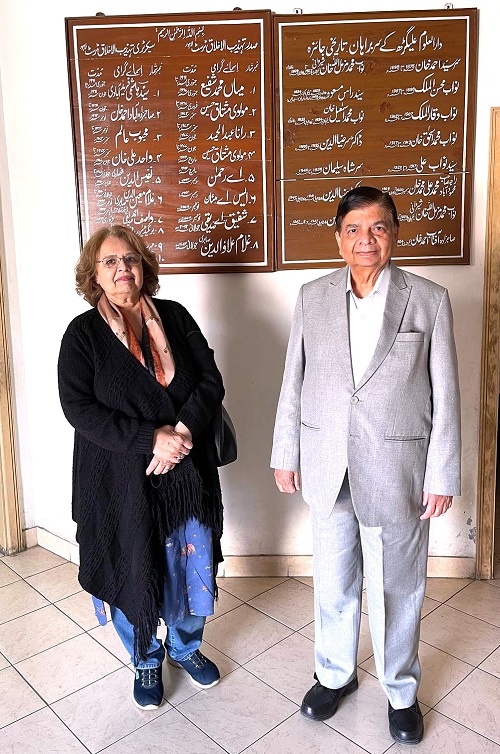
Nuzaira Azam and Zafar Iqbal
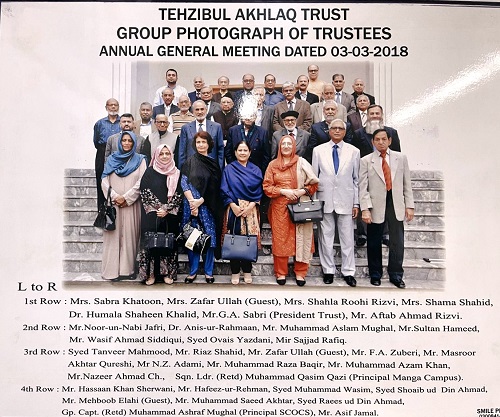
Picture of TAT executives and trustees
In 1875, Sir Syed founded the Mohammedan Anglo-Oriental (MAO) College in Aligarh, a landmark institution designed to promote scientific and rational thinking while preserving traditional values. Serving as a bridge between Western and Eastern knowledge systems, the college played a vital role in education in India. Its curriculum fostered intellectual growth and prepared students for competitive examinations in government and professional fields.
By encouraging Muslims to learn English and embrace Western scientific methodologies, Sir Syed empowered them to compete effectively in administration, law, and medicine. The MAO College later evolved into Aligarh Muslim University (AMU), whose alumni continue to carry Sir Syed's legacy by establishing and promoting quality educational institutions worldwide.
During my recent travels in Pakistan, I had the opportunity to visit Aligarh institutions in Islamabad, Lahore, and Karachi, witnessing firsthand the enduring impact of Sir Syed's vision.
Sir Syed Memorial Society (SSMS), Islamabad: The Sir Syed Memorial Society (SSMS) in Islamabad honors Sir Syed Ahmed Khan's legacy as a reformer and educationist. Established as a cultural and educational hub, SSMS remains dedicated to intellectual and societal advancement through various initiatives.
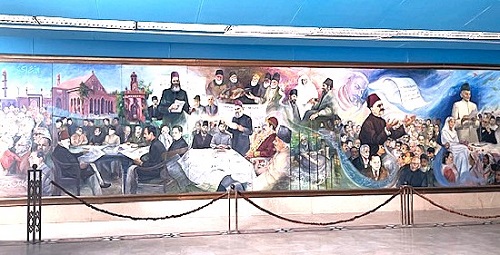

Murals in the Library building
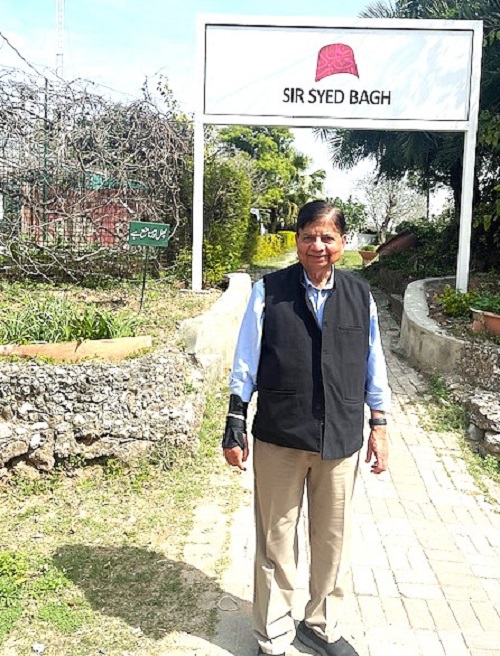
Write in front of Sir Syed Bagh

Sports complex in SS Memorial campus
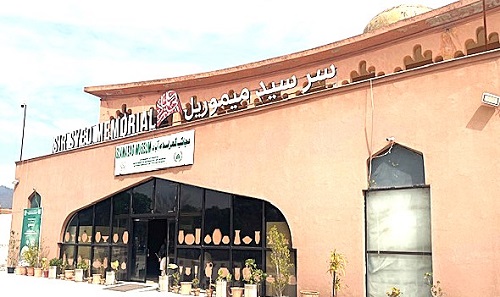
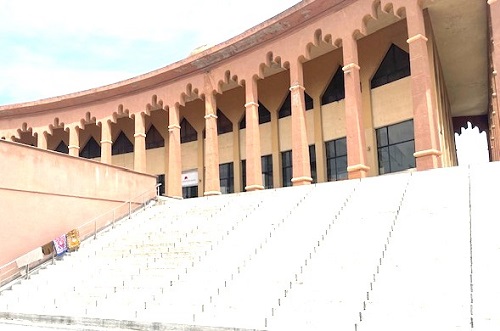
Sir Syed Memorial buildings
A key endeavor is revitalizing its library, featuring extensive Urdu and English literature spanning history, archaeology, science, and technology. The Islamabad Museum within the Memorial Building, established in 2002, also showcases significant cultural and historical artifacts, preserving the region's heritage. The Society also hosts conferences, seminars, and cultural events in its modern auditorium, fostering intellectual and artistic exchange.
The concept of a Sir Syed Memorial emerged in the early 1980s, spearheaded by members of the Central Aligarh Old Boys Association. Major General (Retd) S. Ali Nawab and his associates initiated the project, gaining momentum through a nationwide appeal led by Syed Ali Nawab, Iqbal M. Shafi, S. Musharrafuddin, and Iqbal Ahmad Khan. Through collective efforts and widespread support, the Sir Syed Memorial Building in Sector G-5/1, Islamabad, is a testament to Sir Syed's enduring legacy. Syed Ahmed Masood, Sir Syed's great-great-grandson, currently serves as the Society's President.
Aligarh Public School and College/New Aligarh University: Founded in 1967 by the Tehzibul Akhlaq Trust (TAT), Aligarh Public School and College in Manga (Lahore) continues Sir Syed's educational mission. Established in 1961 by Aligarh Muslim University alumni and scholars in Pakistan, the Trust remains dedicated to expanding educational opportunities. My wife's maternal uncle, Nazeeruz Zaman Adhami, an AMU student in the 1950s, played a pivotal role in founding and administering the Trust.
TAT provides quality education at a minimal cost, particularly for underprivileged students. The Tehzibul Akhlaq Outreach Program (TOP) offers financial support and a nurturing learning environment. The current TAT President, Mr G.A. Sabri, highlighted the rapid progress of the New Aligarh University (NAU) Project on the 51-acre Manga Campus, which aims to integrate students from underserved areas into mainstream education and promote national harmony. The school's land, associated initially with Gurudwara Chota Nanakiana, was repurposed post-Partition in 1947 for educational activities.
All Trust members serve voluntarily, ensuring affordability through moderate fees, scholarships, and financial aid. Children of school employees receive full fee exemptions, and merit-based scholarships reward academic excellence. English serves as the medium of instruction, offering science and arts subjects. Capital expenses, including construction, rely entirely on donations.
Dr Humala Shaheen Khalid, Honorary Secretary General, reaffirmed the Trust's mission to equip youth with modern knowledge while preserving religious and cultural values. The coeducational primary section transitions to separate sections for boys and girls in higher grades, ensuring academic excellence through highly qualified faculty and free remedial classes. Details about TAT activities and plans for NAU are mentioned in its annual report: http://www.tehzibulakhlaqtrust.org.pk/wp-content/uploads/2024/04/Tehziul-Akhlaq-2023-07.pdf .
Sir Syed University of Engineering & Technology (SSUET): Established in 1993 in Karachi, Sir Syed University of Engineering & Technology (SSUET) is a premier private institution named in honor of Sir Syed Ahmad Khan. Upholding his ideals, SSUET emphasizes scientific, technological, and professional education. The university offers undergraduate and postgraduate programs in engineering, computer science, business administration, and related fields, accredited by the Higher Education Commission of Pakistan (HEC) and the Pakistan Engineering Council (PEC).
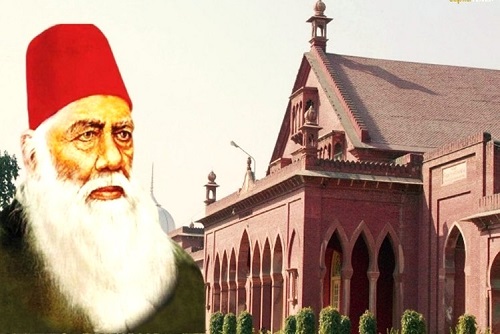
Sir Syed Ahmad Khan
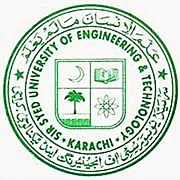
SSUET Emblem
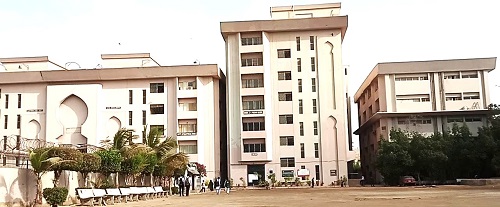
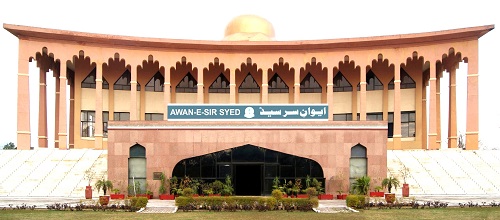

SSUET buildings

. A. Nizami, Founder Chancellor of SSUET
Z.A. Nizami, an esteemed AMU alumnus and founding Chancellor of SSUET, played a pivotal role in realizing the university's vision. SSUET remains a leading center for engineering and technological education in Pakistan.
The Role of Tehreek-e-Aligarh in Nation-Building: Anwar Ehtasham, former secretary of Punjab's school education department, has highlighted Pakistan's deepening education crisis 77 years after the country's independence. In his article "Do We Need A Tehreek-e-Aligarh 2.0?" (published on March 10, 2025, in The Nation International), Ehtasham underscores Pakistan's alarming status as the country with the highest number of out-of-school children, alongside its lagging progress in scientific advancement.
Ehtasham advocates for the launch of Tehreek-e-Aligarh 2.0, a nationwide movement aimed at making education a top priority. He calls for collective action through public advocacy, media engagement, and political consensus. His proposal includes a 10-year charter emphasizing universal education, ethical growth, and societal development, envisioning a more progressive and prosperous Pakistan.

